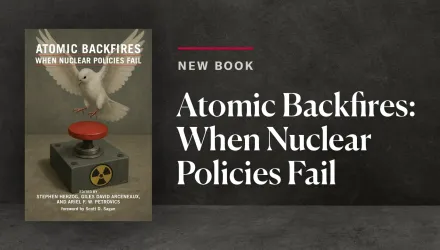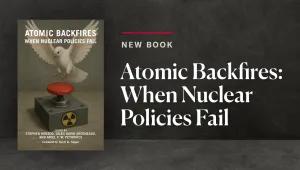AS THE World Trade Center and Pentagon attacks become a more distant memory, many Americans comfort themselves with the thought that 9/11 was a freak accident or a 100-year flood. Yesterday's arrest of 21 suspected terrorists, who were in the operational stage of preparation to blow up airplanes en route from Britain to the United States, serves as another stark wake-up call to the brute fact that so many find so hard to believe: There are a large number of people in the world who seriously want to kill us.
As we applaud the diligence of British security services that unraveled this plot, there are deeper questions Americans should reflect on. Why are so many people prepared to give up their own lives to kill Americans? Why are there so many people in the world who support them? Why do so many people believe that their methods are justifiable?
A year into the war in Iraq, Secretary of Defense Donald Rumsfeld posed a similar question to his four closest colleagues in the Pentagon in a memo that was subsequently leaked. About US strategy in the global war on terrorism, he asked: ``Are we capturing, killing, or deterring and dissuading more terrorists every day than the madrassas and the radical clerics are recruiting, training, and deploying against us?"
Assessing our adversaries' numbers dynamically and seeking to understand their motivation clinically is not to sympathize with them, but to attempt to design better strategies to defeat them. That requires understanding how our actions increase sympathy, support, and incentives for would-be killers. As commanders of US forces in Iraq have observed, if by calling down airstrikes on a house containing one terrorist and 10 innocents we subtract one terrorist but recruit 10 replacements, we move backward in our mission.
Nine months after 9/11, Al Qaeda announced its goal to kill four million Americans. As an affiliated website stated: ``We have the right to kill four million Americans -- two million of them children -- and to exile twice as many and wound and cripple hundreds of thousands" to compensate for the Muslims killed by what Osama bin Laden called the ``Jewish-Christian crusaders."
One can only imagine how bin Laden's target number is growing as the war in Iraq continues, and now as Israel pursues its campaigns in Gaza and Lebanon.
The capture of the would-be plane bombers in London should cause us to reflect on our longer-run strategy for what the president has rightly called the ``long war" on terrorism. In that war, there are today more people who see the United States as the major threat to themselves than there were on 9/11. In that war, the war in Iraq has caused more people around the world to support terrorists who want to kill us. Clearly, we must continue efforts at monitoring, disrupting, capturing, incarcerating, or eliminating determined killers. But a strategic reassessment of our longer-term strategy for the war on terrorism would highlight at least three areas that require substantial change on our part.
First, we must acknowledge that the surest way to generate terrorists is to occupy their territory. The French learned this in Algeria; the Israelis, in the occupation of Lebanon from 1978 to 2000. To the extent that US troops are seen as occupiers in Iraq or Israeli troops occupiers in Lebanon, history would predict we motivate terrorists. The quiet, unadvertised withdrawal of US forces from bases in Saudi Arabia removed one of bin Laden's raison d'etre: to force American and other ``crusaders" to remove their troops from Arab lands.
Second, we must recognize that most of the actions required to discover and capture terrorist plotters like the ``London 21" will be taken by other governments -- or not at all. However great our effort, it cannot approach the extent and effectiveness of the British government in Britain, the Saudi government in Saudi Arabia, the Pakistani government in its country. But gaining their assistance will require greater sensitivity to these governments' and their citizens' concerns on issues at the top of their agendas. To Americans who ask why we care that majorities even in allied countries disapprove of the United States and especially the Bush administration and believe that America is the greatest threat to international security, the answer is that their cooperation in outing a jihadist in their midst may be essential to our security.
Finally, we must delegitimize terrorism -- making it as internationally unacceptable as slavery or piracy.
As President Bush has rightly said, we live in a ``dangerous world." Effectively combating this threat will, however, require more imagination and harder choices in the long run.
Graham Allison is director of the Belfer Center for Science and International Affairs and author of ``Nuclear Terrorism: The Ultimate Preventable Catastrophe."
Allison, Graham. “Assessing our Adversaries.” The Boston Globe, August 11, 2006





